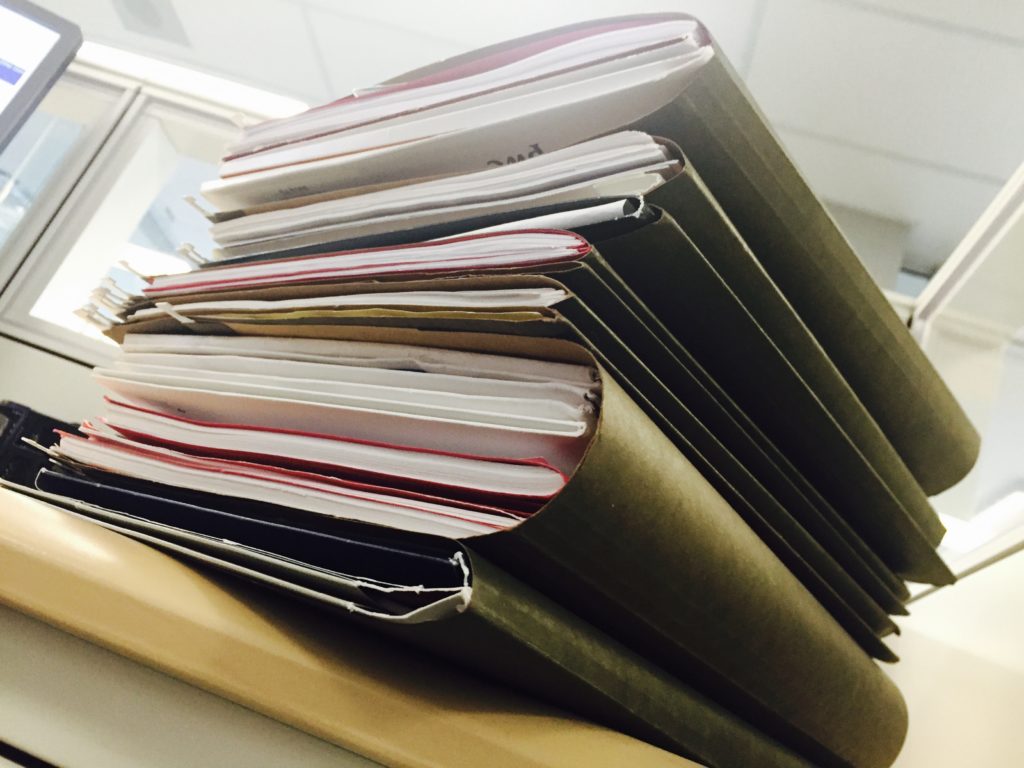Have you ever found that you are surrounded by paper with no end in sight? Ever look at your desk and the piles of paper on it and think “Why can’t we go paperless and get rid of all of this?” One solution to the “paper problem” is to go paperless. When people use the term “paperless” typically, they are misusing it. The common presumption is that paperless means paper-free, when in fact this is not the case. If you thought paperless and paper free were the same thing, pull up a chair, we need to talk.
Let’s start by outlining these two concepts. Both refer to how much paper is in and around the office. “Paper-free” means that there is precisely NO paper in the office. Everything is digital, everything is online, and nothing gets printed. This is something that can be good as an inspirational goal, but in my experience, it’s not a realistic one.
“Paperless” is the much more interesting concept. Whenever I talk to people about a paperless office, they assume I mean paper free. In reality paperless means precisely what it says; paper…less, or to put it in other words…less paper! You use paper, but keep the information in a digital space. Being paperless is also far more achievable than being paper free.
The misconception about what paperless means is an obstacle that I have worked hard to clarify for all the years that I have been in information management. The people I have worked for are usually concerned that I will take away their ability to HAVE paper, let alone print anything off. Taking away paper is not what I’m doing.
The philosophy that I have towards paper is very simple. If you’re planning on printing something off, then do so. I completely understand the ease of taking notes on a piece of paper because, on occasion, I also take notes on paper.
I will in meetings (assuming that there is a hand out) make notes on the pages of what seemed interesting or relevant to me. After the meeting is over and I have finished writing all my notes down I scan and recycle the paper. I have the record of the document so for me to keep the hard copy makes no sense.
The outcome of doing this practice is that my office is paperless.
Doing this will serve the purpose of not only Organizing your Digital Life but also tidying up your desk every once in a while. I would make the recommendation that if you were to look around your office and ask yourself if you need the paper on it once every month or so, then you might find that your desk is considerably cleaner and more efficient. Keeping your documents, and especially your copies and versions, digitally is a simple way to keep multiple copies of something and not have a pile of paper on your desk that’s unrecognizable after six months.
There are many advantages to this in the professional world. The best example of this is that if someone is looking for a file you were working on, you can e-mail it to them and they don’t have to come to your desk to get it. They will be pleasantly surprised to find it in their e-mail inbox when they get back to their work area because you were able to locate, attach to an e-mail and send it efficiently.
The advantages in your personal life will be very similar to those in your professional life. Having the ability to look up your credit card statements at a moment’s notice to see if there are any fraudulent charges that need to be corrected. Another reason for a paperless system is to save old family photos from rotting away. I have pictures from the 1940’s when my Grandfather was a kid, and seeing those kinds of things is a great way to look into my family history.
If you are looking to find a way to reduce the amount of papers and clutter you have in your life, going paperless is the best way to go. A digital information system means that you will be able to keep your information organized in a simple and easy way. For most, the main problem of “going paperless” is that of organizing their files in a digital space that they can’t see or feel. If this is an issue you experience, stay tuned. I will be offering a few tips on file naming conventions that will help you to Organize your Digital Life in a logical and methodical way which will allow you to easily find all your files and information.
Which System do you prefer?
Let me know in the comments section below. If you like this blog post and want to see more, you can follow me on Social Media (LinkedIn, Instagram, and Facebook @jasonlovefiles) or Subscribe to my blog to get new content delivered directly to your mailbox.


Hi, I desire to subscribe for this website to obtain latest
updates, so where can i do it please help.
Hi Karl,
if you look at the top of my site (just below my picture) You will see a signup form. All I need is your name and your e-mail and I do not distribute my list to others.
Jason